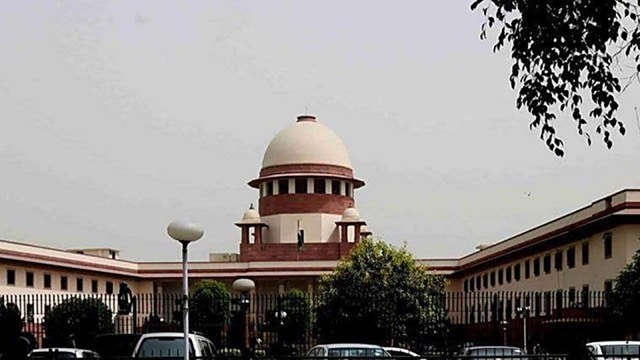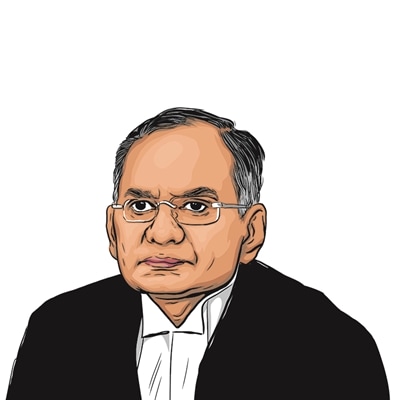Opinion Challenge to Waqf Act: A legal game of fastest fingers first
Passing of Waqf Act is a model of deliberative democracy. To prevent its implementation at this stage is to negate will of people
 The Court steps in only when there is a violation of principles that are higher than the laws of people — that is, the Constitution of India, and specifically, the Fundamental Rights. (Source: File)
The Court steps in only when there is a violation of principles that are higher than the laws of people — that is, the Constitution of India, and specifically, the Fundamental Rights. (Source: File) Whenever a new law is passed by Parliament, the script before the Supreme Court becomes all too familiar. Whether it was the 10 per cent economic reservation, the Kashmir amendments, the citizenship amendments, the Uttarakhand UCC, the same set of petitioners with the same set of lawyers knocks on the doors of the apex court. Behind this is a carefully crafted frenzy, a pre-hearing narrative, yearning for the Court’s intervention, ostensibly to “Save Democracy”. Fitting perfectly into this pattern, the challenge to the Waqf (Amendment) Act, 2025 comes as no surprise. It is worth noting that even before the amendment became operative on April 8, after receiving presidential assent, non-maintainable petitions were filed “preemptively”. Most petitions, far from being genuine, drafted and constructed after a careful study of the law and precedents, have become a game of fastest fingers first. Publicity trumps quality and law becomes the casualty.
Shorn of rhetoric, the constitutional position is that once a legislation is passed by Parliament, it is treated as a manifestation of the peoples’ will. It is intrinsic to basic democracy that the people decide what is right and what is wrong, what is permissible and what is not. The Court steps in only when there is a violation of principles that are higher than the laws of people — that is, the Constitution of India, and specifically, the Fundamental Rights.
Technically speaking, the Constitution is also a document given by the citizens to themselves. However, it allows the ordinary laws of Parliament to be tested against constitutional provisions. This is what is known as judicial review of legislation and is well-entrenched in democracies across the board.
While judicial review is a foundational principle of democracies, there is a marked difference in striking down a law at the stage of a final judgment as opposed to staying of operation of the law at the initial stage. The former deals with declaring a law as violative of the constitutional provisions after considering the arguments at the stage of the final hearing of a matter. On the other hand, staying the operation of the law entails the passing of an interim order preventing the law from even being enforced. This predetermination, without fully analysing the law, is constitutionally suspect.
The difference between the two courses of action might seem semantic in nature, but in reality, both have a huge impact on the democratic fabric of the nation. In order for a text to become a law, it has to pass through both Lok Sabha and Rajya Sabha and receive presidential assent. The sanctity that is attached to laws at the initial stage comes from the presumption of constitutionality. It takes shape owing to the supremacy of people in democracies and their will having the sole constitutional backing to enact any statutory law.
The concept of presumption of constitutionality is an extension of this foundational democratic principle, where the actions of the constitutional body representing the people, in framing the law, are presumed to be valid unless fully proven otherwise. This is not to say that legislative actions are not susceptible to error or subject to judicial review. It only means that the legislative actions of Parliament should not be “set aside” or “stayed” in a routine manner. If the operation of duly passed laws is stayed routinely, without finally adjudicating on the challenge to the same, it would amount to negating the authority of Parliament in enacting laws.
The factors highlighted are further accentuated by the fact that the Waqf (Amendment) Act represents a commendable exercise in parliamentary democracy, contrasting sharply with the diminished standards of legislative scrutiny evident today. The amendment was initiated through a meticulous stakeholder consultation, reflecting a commitment to substantive discourse and thorough legislative deliberation. Upon introduction in the Lok Sabha in 2024, the Bill was thoughtfully referred to a Joint Parliamentary Committee (JPC), comprising 21 Lok Sabha members and 10 Rajya Sabha members. This Committee’s approach is notable: It engaged in 36 meetings, interacting with an array of stakeholders, from religious bodies, academic and civil rights entities. The JPC members undertook detailed on-ground assessments across 10 cities, conducting extensive dialogue with 284 stakeholders, 25 state waqf boards, and representatives from multiple state governments. The resultant product embodies a welcome resurgence of parliamentary diligence and procedural thoroughness, presenting a stark but hopeful divergence from frequent hurried legislations and controversial ordinances prevalent today.
most read
Through this methodical and inclusive legislative ballet, the Act achieves not merely administrative efficiency and legal clarity but also high democratic legitimacy. The Waqf (Amendment) Act emerges as a model of deliberative democracy — where lawmaking is an artful dialogue rather than a mere executive fiat. This rigorous process surrounding the Waqf Amendment Act, emphasises the principle of presumption of constitutionality.
On April 16, exactly a week from the date of its implementation, the Supreme Court is to hear the constitutional challenges to the Act. Should the Supreme Court extend its powers to the extent of staying the operation of a legislation without first adjudicating upon its constitutionality? The answer from precedent, constitutional theory and democratic validation is a resounding “no”. To its credit, the Supreme Court has almost never in history interfered with the operation of a statute at an interim stage.
The writer is a former judge of the Kerala High Court





